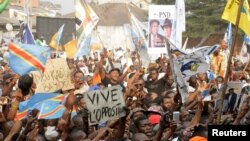Riot police and armored vehicles deployed to a public square in Kinshasa on Saturday, firing tear gas to break up a rally by supporters of popular opposition leader Etienne Tshisekedi, president of the Rassemblement, the largest anti-government coalition in the Democratic Republic of Congo.
Large numbers of riot police arrived overnight at the site of the scheduled event and were still patrolling at midday. From 6 a.m. groups of men, accused by the opposition of being plainclothes policemen, played soccer where the gathering should have happened. The matches still had not finished six hours later.
Tshisekedi had been scheduled to address what was billed as a "popular meeting," called in defiance of a six-week-old ban on political protests in the Congolese capital. The United Nations and local civil society have called without effect for the ban to be lifted.
Tshisekedi had been expected to denounce the intention of President Joseph Kabila to stay in power beyond December 19, the end of his second and — under the current constitution — final term.
Speaking in French to VOA, the secretary general of Tshisekedi’s party, Jean-Marc Kabund, charged that the government is determined to muzzle the opposition and terrorize the Congolese people. He said the international community should realize that government warnings about disruptions of public order are simply intended to justify a flagrant violation of the constitution.
The meeting was supposed be the Rassemblement’s first public show of strength since a protest it organized on September 19 turned violent. On that occasion, security forces killed nearly 50 people according to a United Nations count.
The interior minister accused the Rassemblement of attempting an ‘insurrection’ and on September 22 the governor of Kinshasa banned all political demonstrations in public places until further notice.
After the Rassemblement announced its plans for Saturday's meeting, the local government reaffirmed the prohibition on protests and the national police force declared it would not tolerate "any disturbance of public order."
On the same day, eight local civil society groups issued a statement contesting the legality and constitutionality of the ban. They accused the governor of Kinshasa of acting in the interests of President Kabila’s ruling alliance, to which the governor belongs.




